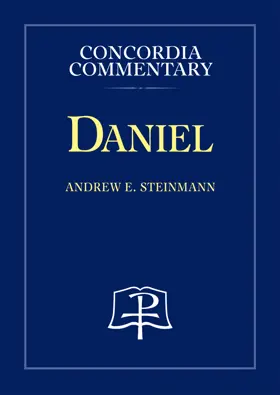

Daniel
Pages
628 pages
Publisher
Concordia Publishing House
Published
7/1/2008
ISBN-13
9780758606952
Reviews
I've been teaching the book of Daniel to students for 3 years now. And having read both Longman's and Miller's commentaries as well, I have to say that I enjoyed Steinmann's interpretation of the historical view the most (Like Longman and Miller, Steinmann holds to the historical 6th century interpretation of Daniel). I was impressed by the literary analysis available at the beginning of each chapter along with the amount of historical and archeological consideration. On a self-edification level, I even appreciated the sections spent after each chapter harmonizing the Lutheran confessions with Scripture (being a non-Lutheran myself), but they are easily skipped if you don't care for the extra content.
Overall, for a historical view of Daniel, this would easily be my go-to recommendation, and I hope to add it to my own shelves soon.
St. Louis: Concordia, 2008. Pp. xlviii + 628. Hardcover. $42.99. ISBN 0758606958. Ian Young University of Sydney Sydney, Australia Commentaries on biblical books vary in the amount of technical detail on questions of language and text one finds; on how much concentration there is on questions of ancient background, archaeological discoveries, and so forth; and to what degree a commentary is “theological,” and if so what sort or tradition of theology is being pursued. This review of Andrew Steinmann’s substantial commentary on Daniel will attempt to place the work within those parameters. Steinmann’s commentary is found within the Concordia Commentary series, whose subtitle is “A Theological Exposition of Sacred Scripture.” In the editor’s preface we learn that Concordia Publishing House is “the publishing arm of the Lutheran Church–Missouri Synod” and hence “is bound to doctrinal agreement with the Scriptures and the Lutheran Confessions” (xiii). The editors make it clear that this means that the series will comprise “Christ-centred, Christological commentaries” expounding such Lutheran emphases as “Law and Gospel” (xii). “The editors and authors accept without reservation that the canonical books of the Old and New Testaments are, in their entirety, the inspired, infallible, and inerrant Word of God” (xii), which means the “acceptance of plenary and verbal inspiration” (xiii). In line with this editorial statement, Steinmann’s commentary argues that “the structure of Daniel is intended to highlight the central, messianic figure called the ‘Son of Man’ (Dan 7:13)” (26).
[Full Review]

